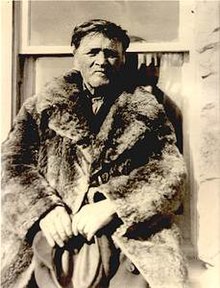Iwan Pylypow

Ivan Pylypiv or Iwan Pylypow (Template:Lang-uk, September 28, 1859 - October 10, 1936) and Vasyl Eleniak were the first Ukrainian immigrants to Canada in 1891–93.
Pylypow was born in the village of Nebyliv in Kalush county (povit) in Austrian Galicia (today Rozhniativ Raion, Ivano-Frankivsk Oblast). He was a peasant logging contractor, and after falling on hard times considered finding a better life abroad, like many other Galicians of the time. Pylypiv had heard about free lands in Canada from German neighbours, and after corresponding with former classmate Johan Krebs, who had settled near Medicine Hat, Alberta, he set off for Canada with his friends Eleniak and Tyt Ziniak in the fall of 1891.
Ziniak was turned back at the Austrian border, but Pylypiv and Eleniak travelled via Halifax to Winnipeg, Manitoba, where they met several German loggers who had worked for Pylypow. They visited the loggers' homesteads near Langenburg, Saskatchewan, and went as far west as Calgary, Alberta. Unimpressed with the land near the railway, they went back to Manitoba, where a visit to a Mennonite settlement at Gretna convinced Pylypow that Canada was a viable destination. Eleniak, out of money, stayed to work for the winter, while Pylypow returned to Galicia for their families before settling in Canada permanently.
When he arrived back in Austro-Hungary his account of vast, unsettled lands prompted both excitement and skepticism. When some learned that Pylypiv expected to receive a commission from a Hamburg steamship company and accused him of swindling, he was arrested for sedition, soliciting emigration, and fraud. After awaiting trial for three months in jail, on May 12, 1892, he was sentenced to another month. Although Pylypiv's efforts at promotion were doused, his arrest and trial had generated publicity, and seven families led by Anton Paish and Mykola Tychkovsky set off for the Canadian Prairies. A few stopped to work briefly with Eleniak in Gretna, and then continued on to meet the rest in Alberta. With the help of Krebs, the families found homesteads near a German-speaking colony, north-east of Edmonton.
Pylypiv and his family finally caught up with the group in 1893, settling at Edna-Star, Alberta, in the vicinity of Fort Saskatchewan, where he farmed and became very active in the co-operative movement. He died a wealthy man in 1936 at the age of 77 years.[1]
His farmhouse is now a part of the Ukrainian Cultural Heritage Village, located east of Edmonton, Alberta. The "Pylypow Industrial" subdivision of Edmonton, and Pylypow Lake in Saskatchewan are also named after him.
See also
- Ukrainian Canadian
- Joseph Oleskiw, another early promoter of Ukrainian emigration to Canada
References
- ^ Farm and Ranch Review, June 1, 1957 (which gives his name as Pilipiwski)
- Martynowych, Orest (1991). Ukrainians in Canada: The formative period, 1891–1924, pp. 60–61. Edmonton: Canadian Institute of Ukrainian Studies. ISBN 0-920862-76-4.
- Nay, Marshall A. (1997). Trailblazers of Ukrainian emigration to Canada: Wasyl Eleniak and Ivan Pylypow, Brightest Pebble. ISBN 0-9699669-6-2.
- Subtelny, Orest (1988). Ukraine: A History. Toronto: University of Toronto Press. p. 546. ISBN 0-8020-5808-6.
External links
- Seeds in Their Pockets: Real-time borshch and chichky at the Ukrainian Cultural Heritage Village by Marilynn McAra
- Pylypow's storyat Alberta: Home, Home on the Plains
- Pylypow house at the Ukrainian Cultural Heritage Village Guided Tour[dead link]
- Pylypiw, Henry. "Ivan Pylypiw". VirtualMuseum.ca.
- Historic Gardens Bloom Again at Ukrainian Village at Alberta Heritage
- Wasyl Eleniak at the Encyclopedia of Ukraine
- Wasyl Eleniakat the Alberta Heritage Alphabet
